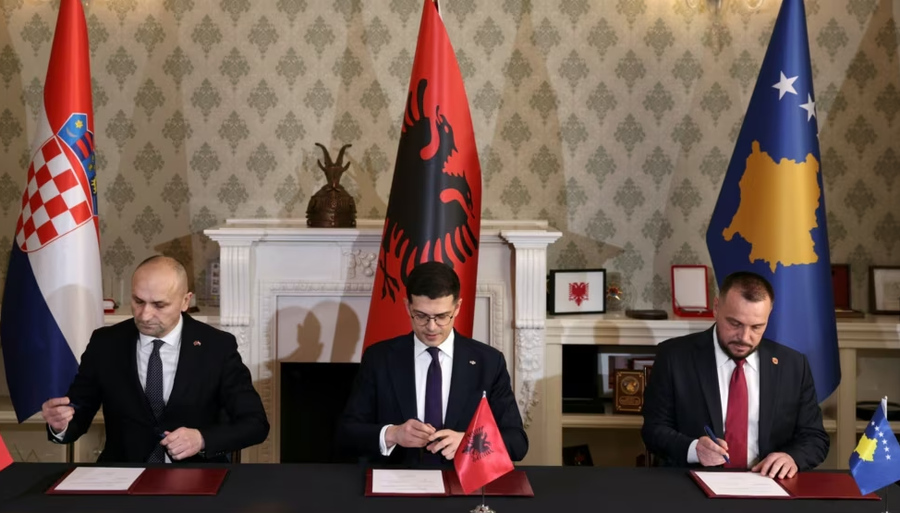
Kosovo, Albania and Croatia signed a declaration in Tirana on March 18, through which the countries commit to strengthening cooperation in the field of defense and security, a development that has prompted reactions in Serbia, which described it as an "open provocation" directed at Belgrade.
Kosovo's Minister of Defense, Ejup Makedonci, signed this statement together with his Albanian counterpart, Pirro Vengu, and his Croatian counterpart, Ivan Anusic.
"Based on our shared values, the same geostrategic orientations and mutual commitments to regional cooperation, Albania, Croatia and Kosovo are committed to strengthening cooperation and advancing steps to protect our territories and peoples, to contribute to international peace and security, as well as to the development of the defense industry," said the Macedonian after signing the declaration.
According to him, the three countries will work to increase interoperability between their militaries through education, training and joint exercises, will engage in combating hybrid threats, and will coordinate policies for Euro-Atlantic integration.
"This cooperation is not a threat to anyone, but an additional commitment to maintaining regional peace and stability in the Western Balkans. Together with Albania and Croatia, Kosovo is stronger, the region safer and the peace more sustainable," said the Macedonian.
Albania and Croatia are member countries of NATO, an organization where Kosovo aims to one day join.
The signing of the declaration comes at a time when Kosovo is continuing the process of transforming the Kosovo Security Force into an army and a few days after Macedonia unveiled details of an initiative to deepen cooperation in the field of defense with the United States.
The Kosovo government has approved in principle the initiative to conclude a framework agreement to deepen cooperation in the field of defense between Kosovo and the United States. He said that Washington will help Pristina in building strategic military capacities.
Albanian Minister of Defense, Pirro Vengu, described the declaration as an important step towards strengthening defense capabilities, developing defense industry and technology, and improving military interoperability in the region.
"Albania and Croatia will continue to support Kosovo in its aspiration for full integration into regional and Euro-Atlantic structures," he wrote in X.
Meanwhile, Croatian Defense Minister Ivan Anusic, after signing the declaration in Tirana, Albania, said that given the geopolitical security risks in Southeast Europe, his country is determined to strengthen relations with Albania and Kosovo.
He said that Croatia, as a member of NATO and the European Union, has valuable knowledge and wants to share it with allies.
"With this initiative, which will also include other interested countries from Southeast Europe, we strengthen our position within NATO and the EU and contribute to a more stable and secure region," he said.
Serbia demands explanation from Croatia and Albania
Following this trilateral declaration of cooperation, the Serbian Ministry of Foreign Affairs said it would urgently request detailed explanations from the Foreign Ministries of Albania and Croatia.
According to Belgrade, Albania and Croatia, by signing this document, "took steps that undermine regional stability."
Authorities in Belgrade, which do not recognize Kosovo's statehood, said this initiative represents "open provocation and gross disregard for the reality on the ground."
"We expect urgent responses from Zagreb and Tirana on the true intentions of this dangerous type of security. Serbia will not allow unilateral actions that could jeopardize our territorial integrity, the security of citizens and peace in the region," the Serbian Foreign Ministry said in a response.
According to Serbia, the declaration of cooperation was the result of "a strategy aimed at isolating Serbia."
Serbia, which does not recognize Kosovo's independence and considers the state part of it, is engaged in dialogue with Kosovo, under the mediation of the European Union, in a process that aims for the full normalization of relations.
In 2023, the parties reached an agreement on the path to normalization, which, among other things, requires Serbia not to hinder Kosovo's membership in international organizations.
Tensions between the two countries have been high in recent years, with Kosovo blaming Serbia for attacks in the Serb-majority north of Kosovo.
Kosovo blames Serbia for the armed attack on the Kosovo Police in Banjska Zvecani in 2023, when a policeman was killed. During the exchange of fire with the Serbian armed group, three Serbian attackers were also killed.
Pristina has also blamed Belgrade for an explosion in the Ibër Lepenc canal in northern Kosovo in November 2024. This canal supplies water to several regions of Kosovo and the Kosovo Energy Corporation for cooling its thermal power plants. Serbia has repeatedly denied Kosovo's accusations./ REL (A2 Televizion)











